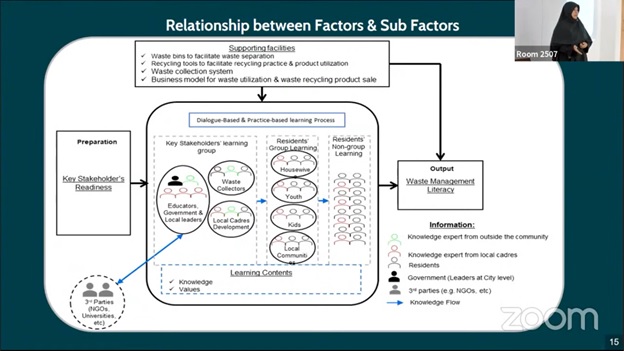One of the issues in developing countries is related to waste. Indonesia is no exception; dealing with, overcoming, and reducing waste in every city remains a major task. So, how do we get out of this situation? Sunarti sought a solution through her doctoral dissertation research at SBM ITB on Tuesday (17/5/2022).
 Sunarti identified several issues in household waste management. The first is a lack of communication, creating a growing gap between awareness and action. Second, there are temporary interventions that result in temporary behavioral changes. The final factor is a lack of active community involvement due to a lack of shared good values.
Sunarti identified several issues in household waste management. The first is a lack of communication, creating a growing gap between awareness and action. Second, there are temporary interventions that result in temporary behavioral changes. The final factor is a lack of active community involvement due to a lack of shared good values.
Individual and social responsibility are required to address the waste problem. As a result, it is essential to have supporting factors. “Long-term interventions through sustainable social learning, iterative learning, management learning that supports and empowers, and knowledge application to communities in society are some of the solutions,” said Sunarti.
The main factors for the community to practice household waste management are dialogue and supportive facilities. Implementing these solutions in the community is hoped to raise awareness and change people’s behavior patterns toward waste management. People will gain a better understanding of its function and purpose as they practice. There will be a desire to manage waste once these values are embedded. In the end, the expected new behavior emerges,” Sunarti stated.
Meanwhile, the facilitator must consider two human factors to change de facto behavior. Internally, there must be awareness of pollution and natural disasters, internal and social values, and individual and social responsibility. Meanwhile, externally, there are a house-to-house waste collection system, waste management in the urban village, and waste recycling facilities.
In short, the cognitive and affective readiness of stakeholders, the presence of supporting facilities, and the readiness to implement the system are all crucial factors that can influence the course of the waste management education program.

The Government as an Influencer
Essentially, the government has a significant role in learning about household waste management. A facilitator’s role in interacting with and being close to the community is critical in forming this behavior; thus, the absence of the government in this program will reduce its effectiveness.
However, it should be emphasized that the government referred to here includes more than just high-ranking central or regional officials. However, it also includes parties with closer ties to the community, such as the Neighborhood Association (RT), Community Association (RW), and Subdistrict (Kelurahan & Kecamatan). It could also be related agencies, such as the environmental service or other organizations with the expertise and ability to facilitate this program.
Sunarti said, Indonesian society has communal characteristics, allowing this learning to have a more significant positive impact through support and cooperation from one individual to another. Furthermore, the communal nature of the project will make it easier for people to carry out household waste management activities through community service and the empowerment of small communities, such as the community of women empowering family welfare (PKK).
We must be optimistic about solving this problem together. If you want to learn more, go to https://www.youtube.com/watch?v=OPsWaUlpy38&feature=youtu.be.




